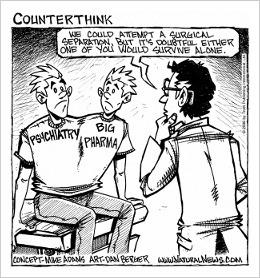 Professor Marc Rodwin’s project grows out of his previous two books on physicians’ conflicts of interest.1 One source of these conflicts of interest is physicians’ financial relationship to pharmaceutical firms. As an Edmond J. Safra Research Lab Fellow, Marc Rodwin is analyzing the legal, financial, and organizational arrangements within which the pharmaceutical industry operates. These sometimes create incentives (for drug firms and their employees) that conflict with the development of knowledge, drug safety, the promotion of public health, and innovation. They also make the public depend inappropriately on pharmaceutical firms to perform certain activities and this leads to institutional corruption. In a series of articles he will analyze the pros and cons of various options for reform.
Professor Marc Rodwin’s project grows out of his previous two books on physicians’ conflicts of interest.1 One source of these conflicts of interest is physicians’ financial relationship to pharmaceutical firms. As an Edmond J. Safra Research Lab Fellow, Marc Rodwin is analyzing the legal, financial, and organizational arrangements within which the pharmaceutical industry operates. These sometimes create incentives (for drug firms and their employees) that conflict with the development of knowledge, drug safety, the promotion of public health, and innovation. They also make the public depend inappropriately on pharmaceutical firms to perform certain activities and this leads to institutional corruption. In a series of articles he will analyze the pros and cons of various options for reform.
As illustration, consider these examples.
Today, drug firms fund and supervise clinical trials to evaluate drug safety and effectiveness. Their incentive to obtain authorization to market drugs and to promote their use once on the market, can bias the clinical trial design, oversight, conclusions, and reporting of results. What options exist to eliminate this bias?
- The income of drug firms, their key executives, and drug detailers rise as drug sales increase, even if drugs are prescribed for unapproved uses and/ or used inappropriately. This incentive even encourages the illegal promotion of unapproved drug uses. What financial and legal changes could create incentives for drug firms to encourage appropriate drug use and to identify and report problems with drug safety?
- To promote research and development, patent laws protect drug firms from competition and tax subsidies increase their profits. These incentives, however, are not directed to particular kinds of patents (such as new molecular entities) or particular kinds of research, or the development of new therapies and so may not effectively stimulate activities that policymakers seek. What changes could direct incentives more appropriately?
- Drug firms provide substantial discretionary funding for important medical activities such as continuing medical education, medical research, medical journals, and professional medical societies. Pharmaceutical firm funding, however, can compromise these activities and bias their direction. How might changes in the control or direction of funding reduce or eliminate these risks?
Project Publications to Date:
Rodwin, Marc A. 2011. “Reforming Pharmaceutical Industry-Physician Financial Relationships: Lessons from the United States, France and Japan.” Journal of Law, Medicine and Ethics 39(4): 662–670.
Rodwin, Marc A. and John Abramson. 2012. “Clinical Trial Data as a Public Good.” The Journal of the American Medical Association 308(9): 871-872.
Rodwin, Marc A. 2012. “Conflicts of Interest, Institutional Corruption, and Pharma: An Agenda for Reform.” Journal of Law, Medicine and Ethics 40(3): 511-522.
__________________________
1 Rodwin, Marc A. Conflicts of Interest and the Future of Medicine: The United States, France and Japan. New York: Oxford University Press, 2011; Rodwin, Marc A. Medicine, Money and Morals: Physicians’ Conflicts of Interest. New York: Oxford University Press, 1993
Attribution: http://www.naturalnews.com/021553_psychiatry_modern.html
